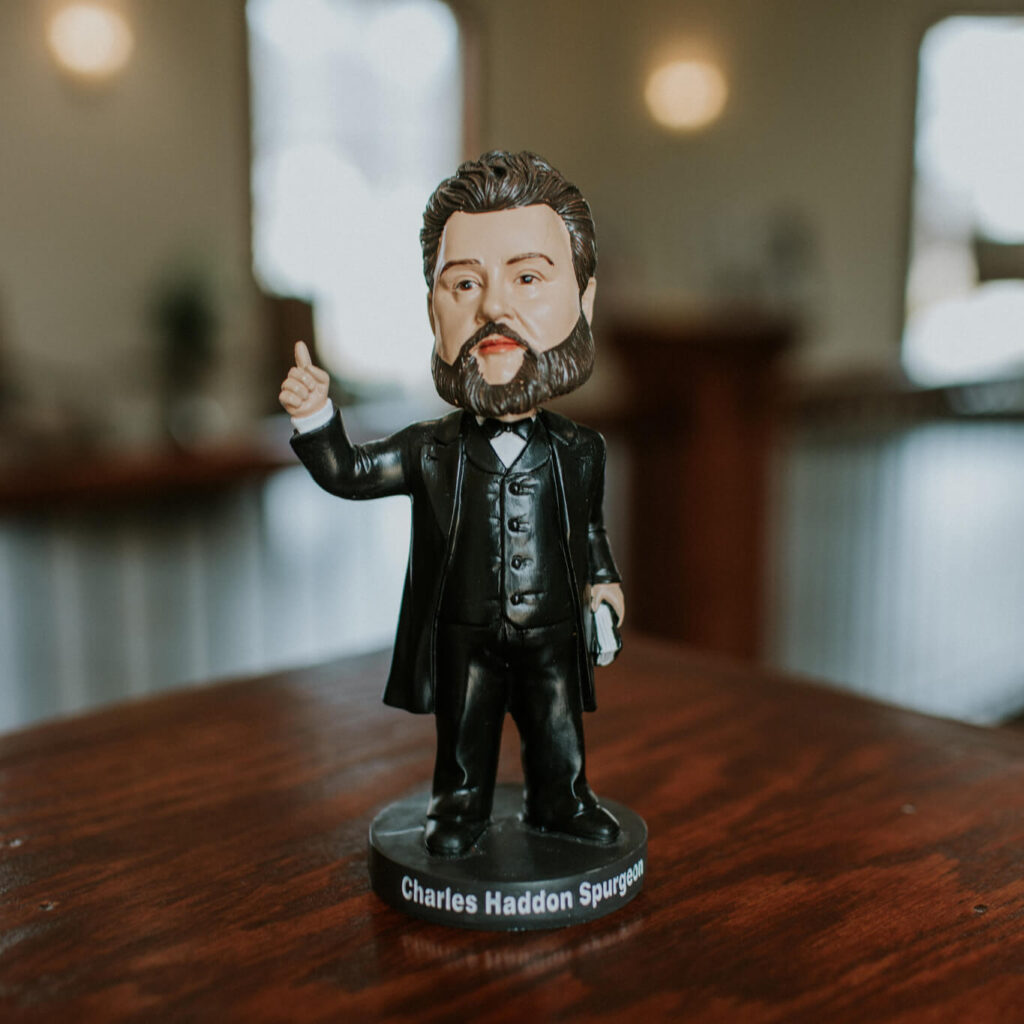
Saturday with Spurgeon

Speak What He Teaches
“Now therefore go, and I will be with thy mouth, and teach thee what thou shalt say” Exodus 4:12
Many a true servant of the Lord is slow of speech, and when called upon to plead for his Lord, he is in great confusion lest he should spoil a good cause by his bad advocacy. In such a case it is well to remember that the Lord made the tongue which is so slow, and we must take care that we do not blame our Maker. It may be that a slow tongue is not so great an evil as a fast one, and fewness of words may be more of a blessing than floods of verbiage. It is also quite certain that real saving power does not lie in human rhetoric, with its tropes, and pretty phrases, and grand displays. Lack of fluency is not so great a lack as it looks.
If God be with our mouth, and with our mind, we shall have something better than the sounding brass of eloquence, or the tinkling cymbal of persuasion. God’s teaching is wisdom; His presence is power. Pharaoh had more reason to be afraid of stammering Moses than of the most fluent talker in Egypt; for what he said had power in it; he spoke plagues and deaths. If the Lord be with us in our natural weakness we shall be girt with supernatural power. Therefore, let us speak for Jesus boldly, as we ought to speak.
Read more...

Saturday with Spurgeon

Doing Good
“Who went about doing good.” Acts 10:38
Read more...

Saturday with Spurgeon

What Is Your Calling?
Read more...

Saturday with Spurgeon

Remain Unshaken
We have many things in our possession at the present moment which can be shaken, and it ill becomes a Christian man to set much store by them, for there is nothing stable beneath these rolling skies; change is written upon all things. Yet, we have certain “things which cannot be shaken,” and I invite you this evening to think of them, that if the things which can be shaken should all be taken away, you may derive real comfort from the things that cannot be shaken, which will remain. Whatever your losses have been, or may be, you enjoy present salvation. You are standing at the foot of his cross, trusting alone in the merit of Jesus’ precious blood, and no rise or fall of the markets can interfere with your salvation in him; no breaking of banks, no failures and bankruptcies can touch that. Then you are a child of God this evening. God is your Father. No change of circumstances can ever rob you of that. Although by losses brought to poverty, and stripped bare, you can say, “He is my Father still. In my Father’s house are many mansions; therefore will I not be troubled.” You have another permanent blessing, namely, the love of Jesus Christ. He who is God and Man loves you with all the strength of his affectionate nature—nothing can affect that. The fig tree may not blossom, and the flocks may cease from the field, it matters not to the man who can sing, “My Beloved is mine, and I am his.” Our best portion and richest heritage we cannot lose. Whatever troubles come, let us play the man; let us show that we are not such little children as to be cast down by what may happen in this poor fleeting state of time. Our country is Immanuel’s land, our hope is above the sky, and therefore, calm as the summer’s ocean; we will see the wreck of everything earthborn, and yet rejoice in the God of our salvation.
Read more...

Independence Day with Spurgeon

Fully Free Indeed!
“The liberty wherewith Christ hath made us free.” Galatians 5:1
This “liberty” makes us free to heaven’s charter—the Bible. Here is a choice passage, believer, “When thou passest through the rivers, I will be with thee.” You are free to that. Here is another: “The mountains shall depart, and the hills be removed, but my kindness shall not depart from thee”; you are free to that. You are a welcome guest at the table of the promises. Scripture is a never-failing treasury filled with boundless stores of grace. It is the bank of heaven; you may draw from it as much as you please, without let or hindrance. Come in faith and you are welcome to all covenant blessings. There is not a promise in the Word which shall be withheld. In the depths of tribulations let this freedom comfort you; amidst waves of distress let it cheer you; when sorrows surround thee let it be thy solace. This is thy Father’s love-token; thou art free to it at all times. Thou art also free to the throne of grace. It is the believer’s privilege to have access at all times to his heavenly Father. Whatever our desires, our difficulties, our wants, we are at liberty to spread all before him. It matters not how much we may have sinned, we may ask and expect pardon. It signifies nothing how poor we are, we may plead his promise that he will provide all things needful. We have permission to approach his throne at all times—in midnight’s darkest hour, or in noontide’s most burning heat. Exercise thy right, O believer, and live up to thy privilege. Thou art free to all that is treasured up in Christ—wisdom, righteousness, sanctification, and redemption. It matters not what thy need is, for there is fulness of supply in Christ, and it is there for thee. O what a “freedom” is thine! freedom from condemnation, freedom to the promises, freedom to the throne of grace, and at last freedom to enter heaven!
Read more...

Saturday with Spurgeon

From the Jaws of Death
The narrative of the manly courage and marvellous deliverance of the three holy children, or rather champions, is well calculated to excite in the minds of believers firmness and steadfastness in upholding the truth in the teeth of tyranny and in the very jaws of death. Let young Christians especially learn from their example, both in matters of faith in religion, and matters of uprightness in business, never to sacrifice their consciences. Lose all rather than lose your integrity, and when all else is gone, still hold fast a clear conscience as the rarest jewel which can adorn the bosom of a mortal. Be not guided by the will-o’-the-wisp of policy, but by the pole-star of divine authority. Follow the right at all hazards. When you see no present advantage, walk by faith and not by sight. Do God the honour to trust him when it comes to matters of loss for the sake of principle. See whether he will be your debtor! See if he doth not even in this life prove his word that “Godliness, with contentment, is great gain,” and that they who “seek first the kingdom of God and his righteousness, shall have all these things added unto them.” Should it happen that, in the providence of God, you are a loser by conscience, you shall find that if the Lord pays you not back in the silver of earthly prosperity, he will discharge his promise in the gold of spiritual joy. Remember that a man’s life consisteth not in the abundance of that which he possesseth. To wear a guileless spirit, to have a heart void of offence, to have the favour and smile of God, is greater riches than the mines of Ophir could yield, or the traffic of Tyre could win. “Better is a dinner of herbs where love is, than a stalled ox and inward contention therewith.” An ounce of heart’s-ease is worth a ton of gold.
Read more...

Saturday with Spurgeon

Happy and Holy
“O my God, be not far from me.” Psalm 38:21
Here we have two great lessons—what to deprecate and what to supplicate. The happiest state of a Christian is the holiest state. As there is the most heat nearest to the sun, so there is the most happiness nearest to Christ. No Christian enjoys comfort when his eyes are fixed on vanity—he finds no satisfaction unless his soul is quickened in the ways of God. The world may win happiness elsewhere, but he cannot. I do not blame ungodly men for rushing to their pleasures. Why should I? Let them have their fill. That is all they have to enjoy. A converted wife who despaired of her husband was always very kind to him, for she said, “I fear that this is the only world in which he will be happy, and therefore I have made up my mind to make him as happy as I can in it.” Christians must seek their delights in a higher sphere than the insipid frivolities or sinful enjoyments of the world. Vain pursuits are dangerous to renewed souls. We have heard of a philosopher who, while he looked up to the stars, fell into a pit; but how deeply do they fall who look down. Their fall is fatal. No Christian is safe when his soul is slothful, and his God is far from him. Every Christian is always safe as to the great matter of his standing in Christ, but he is not safe as regards his experience in holiness, and communion with Jesus in this life. Satan does not often attack a Christian who is living near to God. It is when the Christian departs from his God, becomes spiritually starved, and endeavours to feed on vanities, that the devil discovers his vantage hour. He may sometimes stand foot to foot with the child of God who is active in his Master’s service, but the battle is generally short: he who slips as he goes down into the Valley of Humiliation, every time he takes a false step invites Apollyon to assail him. O for grace to walk humbly with our God!
Read more...

Saturday with Spurgeon

Christ at the Center
Read more...

Saturday with Spurgeon

The Humbling Impact of Grace
“So Mephibosheth dwelt in Jerusalem: for he did eat continually at the king’s table; and was lame on both his feet.” 2 Samuel 9:13
Mephibosheth was no great ornament to a royal table, yet he had a continual place at David’s board, because the king could see in his face the features of the beloved Jonathan. Like Mephibosheth, we may cry unto the King of Glory, “What is thy servant, that thou shouldst look upon such a dead dog as I am?” but still the Lord indulges us with most familiar intercourse with himself, because he sees in our countenances the remembrance of his dearly-beloved Jesus. The Lord’s people are dear for another’s sake. Such is the love which the Father bears to his only begotten, that for his sake he raises his lowly brethren from poverty and banishment, to courtly companionship, noble rank, and royal provision. Their deformity shall not rob them of their privileges. Lameness is no bar to sonship; the cripple is as much the heir as if he could run like Asahel. Our right does not limp, though our might may. A king’s table is a noble hiding-place for lame legs, and at the gospel feast we learn to glory in infirmities, because the power of Christ resteth upon us. Yet grievous disability may mar the persons of the best-loved saints. Here is one feasted by David, and yet so lame in both his feet that he could not go up with the king when he fled from the city, and was therefore maligned and injured by his servant Ziba. Saints whose faith is weak, and whose knowledge is slender, are great losers; they are exposed to many enemies, and cannot follow the king whithersoever he goeth. This disease frequently arises from falls. Bad nursing in their spiritual infancy often causes converts to fall into a despondency from which they never recover, and sin in other cases brings broken bones. Lord, help the lame to leap like an hart, and satisfy all thy people with the bread of thy table!
Read more...

Saturday with Spurgeon

WALK WITHOUT STUMBLING
“He will not suffer thy foot to be moved” Psalm 121:3.
If the Lord will not suffer it, neither men nor devils can do it. How greatly would they rejoice if they could give us a disgraceful fall, drive us from our position, and bury us out of memory! They could do this to their heart’s content were it not for one hindrance, and only one: the Lord will not suffer it; and if He does not suffer it, we shall not suffer it.
The way of life is like traveling among the Alps. Along mountain paths one is constantly exposed to the slipping of the foot. Where the way is high the head is apt to swim, and then the feet soon slide: there are spots which are smooth as glass, and others that are rough with loose stones, and in either of these a fall is hard to avoid. He who throughout life is enabled to keep himself upright and to walk without stumbling has the best of reasons for gratitude. What with pitfalls and snares, weak knees, weary feet, and subtle enemies, no child of God would stand fast for an hour were it not for the faithful love which will not suffer his foot to be moved. “Amidst a thousand snares I stand Upheld and guarded by thy hand; That hand unseen shall hold me still, And lead me to thy holy hill.”
Read more...
